#Vladimir Karol
Video
This sexy lady is... Volodymyr Zelenskyy! :D
Here he parodied Tina Karol, an Ukrainian actress and singer.
Here is the original video - https://www.youtube.com/watch?v=GFkR524qUGg
46 notes
·
View notes
Text
Sleeping Beauty Spring: "Jak se Budí Princezny" ("How to Wake a Princess") (1978 Czech/German film)
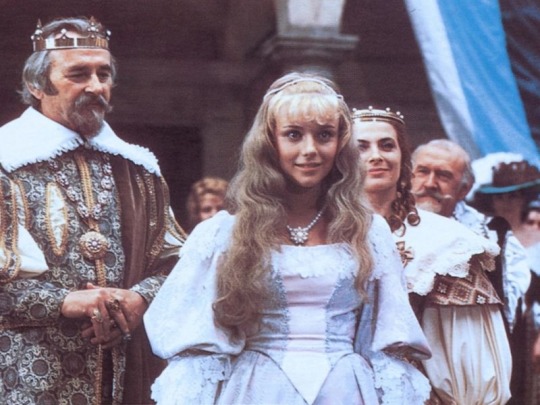
This Czech Sleeping Beauty is effectively a follow-up to the beloved 1973 film Three Wishes for Cinderella. It was likewise a co-production of the Czech studio Barrandov and the East German studio DEFA (which had already produced a German-language Sleeping Beauty in 1971), and likewise directed by Václav Vorlícek, with a musical score by Karol Svoboda, and is based on a Czech variant on the fairy tale from the 19th century collection of writer Božena Němcová. While less well-known than Three Wishes..., at least outside of the Czech Republic, it still has much of the same charm, fleshing out the fairy tale with creativity, warmth, humor, and humanity.
The story opens in the familiar way, as King Dalimil (Jiří Slovak), Queen Eliška (Milena Dvorksá), and their subjects are overjoyed by the birth of Princess Růženka (whose name, like several other foreign names for Sleeping Beauty, means "little rose"). But before long, unique details appear. This version of the tale has no grand christening celebration with fairy godmothers, nor does an angry fairy curse the baby princess. Instead, the villainess is Queen Eliška's jealous older sister, Melánia (Libuše Švormová), who wanted to marry King Dalimil herself, and now lives as a recluse in a dark, crumbling forest castle. When the king and queen visit her with their baby in hope of reconciling, she curses Růženka to prick her finger at age seventeen (not specifically on a spindle – anything sharp will do) and fall asleep forever, as will the whole kingdom with her. But as the king and queen leave in anguish, Melánia's kindly old maidservant cryptically assures them "Love is stronger than death."
Seventeen years later, the king, queen, and princess are visited by the royal family of the Midnight Kingdom. Believing Růženka will be safe from the curse if she goes elsewhere, her father is anxious to see her marry their neighbors' elder son Prince Jiří (Jan Kraus). But Růženka (Marie Horáková), a free-spirited lover of nature and music, is none too eager for an arranged marriage – especially not when Jiří turns out to be a spoiled, arrogant fop. Instead, she's drawn to his handsome, unpretentious younger brother, Prince Jaroslav (Jan Hrušínsky), who returns the sentiment. After various scenes that bring Růženka and Jaroslav closer together, and highlight the difference between the two princely brothers – including an especially funny scene where Jiří fights a "bear," which is really Jaroslav's comic servant Matěj (Vladimir Menšík) in a suit – the castle celebrates Růženka and Jiří's betrothal. Jaroslav leaves in despair after Jiří lies that Růženka doesn't want him at the feast. But at the last moment, Růženka refuses to marry Jiří.
The king and queen increase their efforts to protect Růženka from anything pointy, having thorny plants burnt, swords and knives blunted, and even hedgehogs and bees removed from the land. But secretly, Melánia comes to the castle and leads Růženka to a tower, where she gives her a bouquet of roses, letting her think they're a gift from Jaroslav. Růženka pricks her finger on a thorn and falls asleep, as does all the rest of the kingdom, and Melánia exults at finally being "queen," despite having no subjects to rule over.
Much like Disney's Sleeping Beauty, this film reduces the enchanted sleep from a hundred years to just a few days, so the prince whom Růženka already loves can be the one to wake her. The sole "survivor" of the curse is the beekeeper, who was away at the time, and he hurries to break the news to the Midnight Kingdom's royal family, revealing Růženka's love for Jaroslav in doing so. Clinging to the hope that "love is stronger than death," Jaroslav and his servant Matěj steal back to the Rose Kingdom. After conquering each obstacle – learning to swim within minutes to cross a river, chopping through the forest of rosebushes with which Melánia has surrounded the castle, and digging a drainage channel when Melánia sends a flood – Jaroslav finally reaches the tower and kisses Růženka, breaking the spell. Melánia is chased by the castle's hunting dogs into the river, while the kingdom rejoices at Růženka and Jaroslav's union.
With its lush green settings and rich Renaissance costumes, this film is visually gorgeous, and though the musical score's blend of classical and '70s pop idioms might sound kitschy to some listeners, it has a gentle charm too. The cast is excellent throughout, and though the script takes liberties with the traditional tale, like the Disney version it creates a fresh story that's arguably better suited to cinema. I might wish that the deliciously psychotic Melánia had more screen time and a more spectacular defeat, but her short-shrifting is made up for by the portrayal of the lively yet melancholy Růženka, one of the most fully human of all Sleeping Beauties, and by Prince Jaroslav's growth from ignored, insecure second son to romantic hero.
Just like its more famous sister film, Three Wishes for Cinderella, this unconventional yet lovely Sleeping Beauty retelling is one that I wholeheartedly recommend to lovers of fairy tales.
@ariel-seagull-wings, @thealmightyemprex, @faintingheroine, @reds-revenge, @thatscarletflycatcher, @comma-after-dearest, @paexgo-rosa, @autistic-prince-cinderella, @the-blue-fairie, @themousefromfantasyland
#sleeping beauty spring#jak se budí princezny#how to wake a princess#1978#live action film#fairy tale#czech republic
40 notes
·
View notes
Text

Secondo la stima più quotata ci vogliono almeno 300 mila soldati per difendere il fianco est dell’Europa, dal Mar Baltico al Mar Nero. Non a caso è il numero chiave contenuto nei piani di «risposta rapida» messi a punto dalla Nato fin dal 2014, subito dopo l’illegale annessione della Crimea da parte della Russia e poi rivisti come reazione alla guerra in Ucraina, scatenata da Vladimir Putin.
Nei giorni scorsi il vice comandante delle forze armate polacche, il generale Karol Dymanowski, ha dichiarato pubblicamente che molte migliaia di militari della «Response Force» sono già in Polonia. Sarebbero circa 100 mila. Per il momento non ci sono annunci ufficiali, ma, stando alle indiscrezioni, altri 200 mila saranno mobilitati entro giugno. Anche in questo caso il grosso delle truppe e dei mezzi verrebbe schierato sulla frontiera orientale, anche se non sappiamo esattamente dove. Nello schema approvato nel 2022, al vertice di Madrid, il primo nucleo di 100 mila unità dovrebbe essere pronto a entrare in azione entro 10 giorni; gli altri 200 mila, nel giro di 10-30 giorni. Questi tempi, però, si starebbero stringendo, grazie a continue esercitazioni sul campo, specie in Polonia.
Le ultime notizie sulla guerra in Ucraina, in diretta.
La Nato ha avviato il rafforzamento del «fronte orientale» nel 2017 con l’istituzione di quattro battaglioni in Estonia, Lettonia, Lituania e Polonia. Nel concreto significa avere sul terreno dai 500 ai 1000 soldati ben addestrati ed equipaggiati con le armi più sofisticate. Nel 2022 i capi di Stato e di governo degli allora 30 Paesi membri (oggi sono 32 con Finlandia e Svezia) hanno completato la dorsale aggiungendo quattro battaglioni in Slovacchia, Ungheria, Romania e Bulgaria.
Ognuno di questi otto snodi è affidato al coordinamento di uno dei maggiori Stati. L’Italia ha un ruolo guida in Bulgaria, con l’apporto di militari provenienti da Albania, Grecia, Montenegro, Nord Macedonia, Turchia e Stati Uniti. Le forze armate italiane, inoltre, contribuiscono ai presidi della Nato in Ungheria e in Lettonia.
Naturalmente a queste forze vanno sommate quelle degli eserciti locali. Il più consistente è quello polacco: 120 mila effettivi, che diventano 150 mila se si calcolano i 30 mila della «Forza di difesa territoriale».
Nelle ultime settimane i generali dell’Alleanza Atlantica hanno potenziato i sistemi di sorveglianza e di difesa aerea, gli apparati per sventare sabotaggi cibernetici, subacquei o satellitari.
L’apporto degli americani resta fondamentale in tutti i settori. Da tempo gli Stati Uniti avevano iniziato ad alleggerire la presenza militare in Europa. Nel 2021 i soldati Usa erano 63.835, vale a dire sette volte meno dei 430 mila degli anni Cinquanta. Oggi sono circa 100 mila: sempre più numerosi in Polonia (12.000), in Romania (4 mila) nei Baltici. Gli Usa contribuiscono alle operazioni Nato, ma si muovono anche in autonomia. Sempre in Polonia, nel 2022, hanno installato il Comando del V Corpo d’Armata che ha il compito di coordinare le forze di combattimento sul versante più esposto alle minacce putiniane.
C’è, infine, l’ultimo capitolo,da incubo: il pericolo di un attacco atomico. L’arsenale russo è imponente. In particolare si stima che Putin possa disporre di circa 2 mila ordigni nucleari tattici, cioè bombe devastanti anche se con un raggio d’azione di qualche chilometro e quindi utilizzabili nelle guerre convenzionali, come quella in Ucraina.
Secondo l’«Heritage Foundation», centro studi di Washington,nelle basi americane in Germania, Italia, Olanda, Belgio e Turchia, che è pur sempre un socio del club Nato, ci sarebbero 100 ordigni nucleari tattici. Francia e Regno Unito potrebbero mettere in campo le testate «strategiche», a lunga gittata, in grado di colpire direttamente il territorio russo. Ma significherebbe la catastrofe globale, un punto di non ritorno per tutti.
0 notes
Text
Ver "WILLAX EN VIVO -DOMINGO 21 MAYO 2023 -POLITICAS GARCIA -CONTRACORRIENTE-EDICION ESP - REY CON BARBA" en YouTube
youtube
WILLAX EN VIVO -
DOMINGO 21 DE MAYO DEL 2023
-POLITICAS CON CARLA GARCIA
-CONTRACORRIENTE EL DOMINICAL
-EDICION ESPECIAL CON DIEGO ACUÑA
- REY CON BARBA
- Karol Paredes: Estamos debilitando al Congreso y a la confianza de la ciudadanía.
- Carlos Anderson: Hay trabajadores de la Plaza Bolívar que no van y cobran.
- Jose Cevasco: La transparencia es vital para que el Congreso retome legitimidad.
- Rosa Bartra: El Congreso ha permitido la dinamitización de las bancadas como nunca.
- Sin experiencia en derechos humanos y con 6 carpetas fiscales abiertas por estafa, apropiación ilícita y peculado. La flamante elección del defensor del Pueblo.
- La controvertida vida profesional y política del defensor de Nadine Heredia y Vladimir Cerrón convertido en defensor del Pueblo.
- Defensor del Pueblo, Josué Gutiérrez, tiene 6 carpetas fiscales abiertas en el Ministerio Público
- Nuevo defensor del Pueblo, Josué Gutiérrez, es exabogado de Vladimir Cerrón
- Pacto debajo de la mesa entre Perú Libre y Fuerza Popular permitió elección de nuevo defensor del Pueblo.
0 notes
Text
Culmina el karate de Juegos Estatales Conade 2023
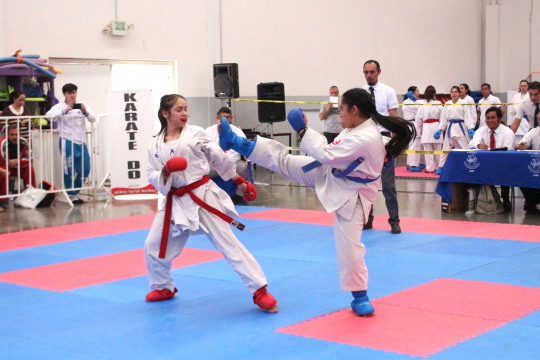
Finalizó el karate de Juegos Estatales Conade 2023, cerrando la actividad con la modalidad de kumite, en el escenario del Polideportivo Sur, con participación de deportistas de Juárez, Chihuahua, Parral y Nuevo Casas Grandes.
En la categoría 2003-2005, el ganador de la división -84 kilogramos fue Gabriel Borjas de Chihuahua, mientras que, en la categoría 2002-2004 la medalla de oro fue para Joaquín Aguiñaga de Chihuahua y plata para Ramiro Zabata de Nuevo Casas Grandes.
Dentro de la categoría 2008-2009, la campeona fue Luna Moriel de Parral en la división -47 kilogramos, seguida por Paulina Villela de Parral y bronce para Nubia Jáquez de Chihuahua.
Categoría 2008-2009
Kumite Fem (-54kg)
1 Mariana Payan NCG
2 Nereida Aderrama NCG
3 Sofia Adame Chihuahua
3 Barbara Orozco Chihuahua
Kumite Fem (-61 Kg)
1 Genoveva García Chihuahua
Kumite Fem (+61 Kg)
1 Ilse Maldonado Chihuahua
2 Renata Baca Chihuahua
Categoría 2008-2009
Kumite Var (-52 Kg)
1 Emiliano Prieto Juárez
2 Marco Quintero Parral
3 Alan Marquez Chihuahua
3 Arath Fraustro Juárez
Kumite Var (-57 Kg)
1 Paul Reyes Chihuahua
2 José Arámbula Juárez
3 Francisco Aguirre Chihuahua
3 Carlos Sánchez Chihuahua
Kumite Var (-63kg)
1 Jeshua Villegas Chihuahua
2 Gael Tapia Chihuahua
3 Osmar Rivero Chihuahua
3 Alfredo Molinar Chihuahua
Kumite Var (-70 Kg)
1 José Campos Parral
2 Emanuel Reveles Chihuahua
Kumite Var (+70 Kg)
1 Horacio Lugo Chihuahua
2 Axel Reza Chihuahua
3 David Rivera Chihuahua
Categoría 2006-2007
Kumite Fem (-48 Kg)
1 Maya Holguin Juárez
2 Ambar Gómez Juárez
3 Joselyn Marquez Juárez
Kumite Fem (-53 Kg)
1 María Andrea Maldonado Chihuahua
Kumite Fem (-59 Kg)
1 Edith Favela Chihuahua
2 Andrea Borjas Chihuahua
3 Ana Valeria Amezcua Chihuahua
3 Rubí Sotelo Chihuahua
Kumite Fem (-66 Kg)
1 René Prieto Juárez
2 Marcela Rangel Chihuahua
Kumite Fem (+66 Kg)
1 Vanessa Gándara Chihuahua
2 Rosa Pérez Chihuahua
Categoría 2006-2007
Kumite Var (-55kg)
1 Diego Barrón Juárez
2 Francisco Corral Juárez
3 Vladimir Delgado Juárez
3 Adrián Hernández NCG
Kumite Var (-61 Kg)
1 Yehoshua Reza Juárez
2 Aaron Solís Parral
3 Damián Corralejo Juárez
3 Cesar Otero Juárez
Kumite Var (-68 Kg)
1 Paul Ibarra Chihuahua
2 Omar Vázquez Chihuahua
3 Gael Aguiñaga Chihuahua
3 Leonardo Pérez Chihuahua
Kumite Var (-76 Kg)
1 Diego Lujan Chihuahua
2 Karol Cordoba Chihuahua
3 Ángel Rodríguez Chihuahua
Kumite Var (+76 Kg)
1 Juan Aguilera Chihuahua
2 Julio Quezada Chihuahua
3 Cesar Álvarez Chihuahua
3 Juan Carlos Torres Juárez
Categoría 2003-2005
Kumite Fem (-50 Kg)
1 Lluvia Ríos Chihuahua
2 Yara Valverde Chihuahua
3 Yamilet García Chihuahua
3 María Del Carmen Castillo Chihuahua
Kumite Fem (-55kg)
1 Ana Maldonado Chihuahua
2 Evelyn Hernandez Chihuahua
3
3
Kumite Fem (-61 Kg)
1 Daniela Muñoz NCG
2 Alejandra Moriel Juárez
3 Ayumi Villegas Chihuahua
3 Stephanie Terrazas Chihuahua
Kumite Fem (-68 Kg)
1 Andrea Avalos Chihuahua
Kumite Fem (+68 Kg)
1 Ana Castro Juárez
2 Raquel Prieto Juárez
0 notes
Text
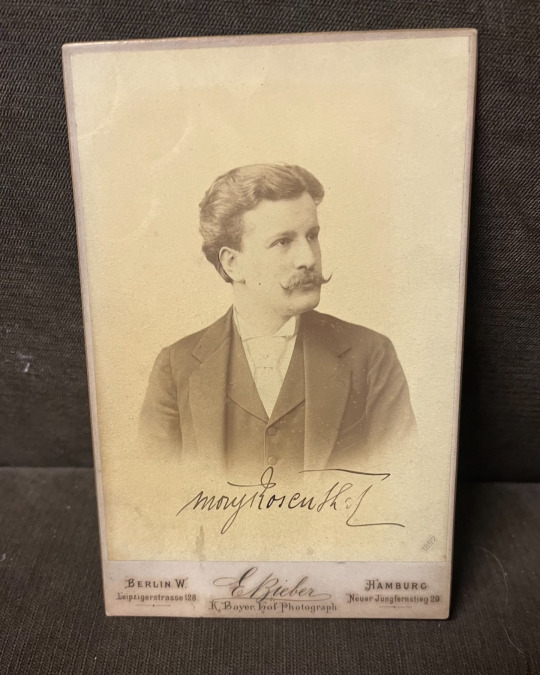
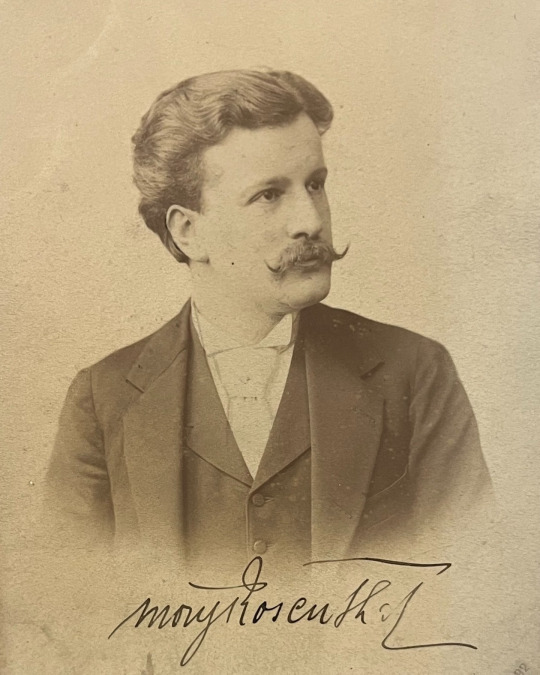
OTD in Music History: Historically important virtuoso pianist Moriz Rosenthal (1862 - 1946) is born in what is now Ukraine.
A student of Karol Mikuli (1821 - 1897, Chopin’s pupil and editor) and Franz Liszt (1811 – 1886), as a mature artist Rosenthal became good friends with many of the greatest composers of the latter half of the 29th Century, including Johann Strauss II (1825 – 1899), Johannes Brahms (1833 – 1897), Camille Saint-Saëns (1835 – 1921), Jules Massenet (1842 – 1912), and Isaac Albéniz (1860 – 1909).
Rosenthal's malicious wit was the stuff of legend. After hearing fellow supervirtuoso Vladimir Horowitz (1903 - 1989) blaze through the octave passages of Pyotr Tchaikovsky's (1840 – 1893) First Piano Concerto (1875) as fast as he could at his legendary Viennese debut, he remarked: "He is certainly an Octavian, but not a Caesar." In a similar vein, after hearing Ignacy Jan Paderewski (1860 - 1941) perform for the first time – Paderewski being one of the biggest matinee idols of the day, and a pianist who was always more beloved by the masses (perhaps in part of his movie-star good looks) than he was respected by his colleagues and the critics – Rosenthal remarked: "Yes, he plays well, I suppose… but he's no Paderewski.”
Rosenthal left behind a recorded legacy of around three hours' worth of music, which was put to disc between 1928 and 1942 for a wide array of labels include Columbia, Edison, Ultraphon, EMI, and RCA Victor. All of it is of remarkable quality, and well worth a listen for any serious student of the piano or any listener interested in stylistic practices that were in evidence during the “Golden Age of the Piano.”
PICTURED: A c. 1893 cabinet photo showing the young Rosenthal, which he signed.
#Moriz Rosenthal#Rosenthal#Polish pianist#pianist#Polish composer#composer#piano#classical composer#pedagogue#teacher#piano concerto#Piano#Concerto#Concert#classical#classical music#music#music history#classical studies#Fortepiano#conductor#orchestra#symphony#concert hall
0 notes
Video
vimeo
Athenahealth "Lonely Data" Director's Cut from Loop on Vimeo.
Can health tech be cool? Hell yeah! For health tech giant Athenahealth’s reimagined brand, we mixed live-action, CG and stop-motion to create many individual pieces of creative – spots, social, print, OOH and everything in-between.
Client: Athena
Agency: Colossus
Directed by: Aggressive
Production: Aggressive/LOOP
Directors: Alex Topaller, Dan Shapiro
Executive Producer: Alexander Aab
Creative Directors: Alex Mikhaylov, Max Chelyadnikov
Art Director: Alex Mikhaylov
Post Producer: Dustin Pownall
DOP: Kuba Burakiewicz
Line Producer: Lukasz Tomasz Koltunowicz
Editors: Jason Yantz, Tomasz Maczka
Storyboard Artist: Mercer Boffey
Colorist: Dominik Deras
Music, Sound Design, Mix: Massive Music
Production Designer: Magda Kostyra
Props Master: Jan Hernik
Production Manager: Karol Nowicki
1st AD: Roman Grad
Gaffer: Maciej Garwoliński
Key Grip: Marcin Wieczorek
Stream: Pawel Stopyra
Make Up: Ania Slowinska
Hair: Dominik Szatkowski
Stylist: Katarzyna Kryst
Casting Director: Sylwia Blaszczyk
Actors: Atta German, Ewa Rodart, Sudheir Kumar
CG Supervisor: Max Chelyadnikov
3D Animation Lead: Dmitriy Paukov
2D Animation: Vladimir Tomin
Modelling: Filipp Gorbachev, Dmitriy Paukov
Lighting/Shading: Filipp Gorbachev, Max Chelyadnikov
Compositing: Max Chelyadnikov, Dan Shapiro, Javier Devitt
Offline: Dan Shapiro, Won Cha
CG Stills Lead: Alex Petrovsky
Stop Motion Creative Director: Salman Sajun
Stop Motion Animation Director: Mathew Richards
Stop Motion Producer: Hussain Alladin
Stop Motion Associate Producer: Catherine Chebeia
Stop Motion DOP: Damien Ligiardi
Stop Motion Art Director: Gabrielle Mullholland
Stop Motion Animation & Props: Christopher Carletti, Marianne Khayat, Audery Rainville
Stop Motion Cleanup: Rushant Gautam
0 notes
Video
vimeo
Athenahealth "Olivia" Director's Cut from Loop on Vimeo.
Can health tech be cool? Hell yeah! For health tech giant Athenahealth’s reimagined brand, we mixed live-action, CG and stop-motion to create many individual pieces of creative – spots, social, print, OOH and everything in-between.
Client: Athena
Agency: Colossus
Directed by: Aggressive
Production: Aggressive/LOOP
Directors: Alex Topaller, Dan Shapiro
Executive Producer: Alexander Aab
Creative Directors: Alex Mikhaylov, Max Chelyadnikov
Art Director: Alex Mikhaylov
Post Producer: Dustin Pownall
DOP: Kuba Burakiewicz
Line Producer: Lukasz Tomasz Koltunowicz
Editors: Jason Yantz, Tomasz Maczka
Storyboard Artist: Mercer Boffey
Colorist: Dominik Deras
Music, Sound Design, Mix: Massive Music
Production Designer: Magda Kostyra
Props Master: Jan Hernik
Production Manager: Karol Nowicki
1st AD: Roman Grad
Gaffer: Maciej Garwoliński
Key Grip: Marcin Wieczorek
Stream: Pawel Stopyra
Make Up: Ania Slowinska
Hair: Dominik Szatkowski
Stylist: Katarzyna Kryst
Casting Director: Sylwia Blaszczyk
Actors: Atta German, Ewa Rodart, Sudheir Kumar
CG Supervisor: Max Chelyadnikov
3D Animation Lead: Dmitriy Paukov
2D Animation: Vladimir Tomin
Modelling: Filipp Gorbachev, Dmitriy Paukov
Lighting/Shading: Filipp Gorbachev, Max Chelyadnikov
Compositing: Max Chelyadnikov, Dan Shapiro, Javier Devitt
Offline: Dan Shapiro, Won Cha
CG Stills Lead: Alex Petrovsky
Stop Motion Creative Director: Salman Sajun
Stop Motion Animation Director: Mathew Richards
Stop Motion Producer: Hussain Alladin
Stop Motion Associate Producer: Catherine Chebeia
Stop Motion DOP: Damien Ligiardi
Stop Motion Art Director: Gabrielle Mullholland
Stop Motion Animation & Props: Christopher Carletti, Marianne Khayat, Audery Rainville
Stop Motion Cleanup: Rushant Gautam
0 notes
Link
3 notes
·
View notes
Text
⭐💡.The 2, 300 Musicians: Music That Everyone In This World Should Know. (2020)
-1- ☁️
Author: Maxine Van Stellanidou. 🕊️✨
1. The Beatles.
2. The Rolling Stones.
3. Queen.
4. The Beach Boys.
5. Bob Dylan.
6. David Bowie.
7. Led Zeppelin.
8. The Doors.
9. Pink Floyd.
10. Elvis Presley.
11. Duke Ellington.
12. Elliott Smith.
13. Jeff Buckley.
14. Lou Reed & The Velvet Underground.
15. Sex Pistols.
16. Ramones.
17. Talking Heads.
18. Maxine Van Stellanidou.
19. Elton John.
20. Miles Davis.
21. Charlie Parker.
22. Thelonius Monk.
23. Louis Armstrong.
24. Patti Smith.
25. Sigur Ros.
26. Bjork.
27. Mum.
28. 2pac.
29. Eminem.
30. Johnny Cash.
31. Run DMC.
32. Philip Glass.
33. Chet Baker.
34. Wolfgang Amadeus Mozart.
35. Ludwig Van Beethoven.
36. Arnold Schoenberg.
37. Igor Stravinsky.
38. Sergej Prokofiev.
39. J. S. Bach.
40. Joseph Haydn.
41. Frederic Chopin.
42. Erik Satie.
43. Edvard Grieg.
44. Benny Goodman.
45. Dizzy Gillespie.
46. Ornette Coleman.
47. Little Richard.
48. Morton Feldman.
49. Julia Wolfe.
50. John Cage.
51. Arvo Part.
52. Sergej Rachmaninov.
53. Dmitrij Shostakovich.
54. Toru Takemitsu.
55. Maxim Keyfman.
56. Jaakko Eino Kalevi.
57. Serge Gainsbourg.
58. U2.
59. Jacques Brel.
58. Francoise Hardy.
59. XXXTentacion.
60. Coldplay.
61. Vladimir Visotsky.
62. Brian Eno.
63. John Lennon.
64. Johann Johannsson.
65. Nico Muhly.
66. BTS.
67. Antonio Vivaldi.
68. Franz Schubert.
69. Michael Jackson.
70. Nirvana.
71. Janis Joplin.
72. Robert Johnson.
73. Jimi Hendrix.
74. Amy Winehouse.
75. Nine Inch Nails.
76. Joep Beving.
77. Max Richter.
78. Olafur Arnalds.
79. Otis Redding.
80. Yann Tiersen.
81. Bill Evans.
82. Leonard Bernstein.
83. George Gershwin.
84. The Notorious B. I. G.
85. Leadbelly.
86. Moondog.
87. Gustav Mahler.
89. Howlin Wolf.
90. Simon & Garfunkel.
91. Paul McCartney.
92. George Harrison.
93. The Who.
94. Joy Division.
95. Taylor Swift.
96. Jay-Z.
97. Kanye West.
98. Lil Uzi Vert.
99. Green Day.
100. Linkin Park.
101. My Bloody Valentine.
102. Billie Eilish.
103. Petr Tchaikovsky.
104. Modest Mussorgsky.
105. Glenn Miller.
106. Billie Holiday.
107. Ella Fitzgerald.
108. Aretha Franklin.
109. Jean Sibelius.
110. Alexandre Desplat.
111. Hildur Gudnadottir.
112. Linkin Park.
113. Bruno Mars.
114. Bruce Springsteen.
115. Angelo Badalamenti.
116. Radiohead.
117. Vangelis.
118. Sufjan Stevens.
119. Christian Loffler.
120. Metallica.
121. Kendrick Lamar.
122. Frank Ocean.
121. Ennio Morricone.
122. AC/DC.
123. Daniel Johnston.
124. Nick Cave.
125. Yes.
126. Arctic Monkeys.
127. Nino Rota.
128. Georges Bizet.
129. Giuseppe Verdi.
130. The Kinks.
131. Funkadelic.
132. Ray Charles.
133. Frank Sinatra.
134. Nina Simone.
135. Harry Styles.
136. One Direction.
137. David Lang.
138. Benjamin Britten.
139. Ralph Vaughan Williams.
140. John Towner Williams.
141. John Tavener.
142. Maurice Ravel.
143. Claude Debussy.
144. Alfred Schnittke.
145. Robert Schumann.
146. Johannes Brahms.
147. Franz Liszt.
148. Wojciech Kilar.
149. Edward Elgar.
150. Henry Purcell.
151. Guns N Roses.
152. Gabriel Faure.
153. Frank Zappa.
154. Camille Saint-Saens.
155. Frank Sesar.
155. Hector Berlioz.
156. Placebo.
157. Iannis Xenakis.
158. Karol Szymanowski.
159. Krzysztof Penderecki.
160. Ignacy Jan Paderewski.
161. Olivier Messiaen.
162. Karlheinz Stockhausen.
163. Alban Berg.
164. Gyorgy Ligeti.
165. Pierre Boulez.
166. Bela Bartok.
167. Niccolo Paganini.
168. Felix Mendelssohn.
169. Asian Kung Fu Generation.
170. Eazy E.
171. Dr. Dre.
172. Ice Cube.
173. Vladimir Horowitz.
174. Glenn Gould.
175. Sviatoslav Richter.
176. Emil Gilels.
177. Mstislav Rostropovich.
178. Yehudi Menuhin.
179. Martha Argerich.
180. Claudio Abbado.
181. Herbert Von Karajan.
182. Judy Garland.
183. Andy Williams.
184. Marilyn Monroe.
185. Marilyn Manson.
186. Green Day.
187. Beach House.
188. Slowdive.
189. Twenty One Pilots.
190. Clint Mansell.
191. Slash.
192. Blind Lemon Jefferson.
193. The Clash.
194. Madonna
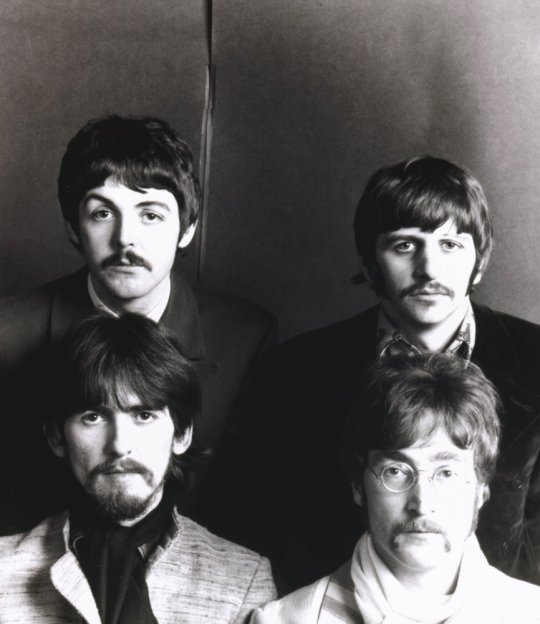
5 notes
·
View notes
Photo

Karol Palka, Balet
2017, Edifice
[EN]For man, unlike any other thing organic or inorganic in the universe, grows beyond his work, walks up the stairs of his concepts, emerges ahead of his accomplishments. This you may say of man—when theories change and crash, when schools, philosophies, when narrow dark alleys of thought, national, religious, economic, grow and disintegrate, man reaches, stumbles forward, painfully, mistakenly sometimes. Having stepped forward, he may slip back, but only half a step, never the full step back.
John Steinbeck, The Grapes of Wrath
"Red room" is a visual journey to the time that most would like to forget - photos document the selected objects which are the remnants of the Communist regime, which years ago rolled out through Europe. Photographs show the interior of the Hotel Polana, the closed Government-run resort, belonging to the Communist Party of Czechoslovakia; The Vladimir Lenin Steelworks, the famous work of socialist realism in which the visit filed m.in Nikita Khrushchev and Fidel Castro; in the pictures is also Polish, inter-enterprise strike resorts of the 1970s. of the 20th century. Photographs are an attempt to understand the surrounding reality which you cannot understand without careful study of the past. Focus on detail and detail allows you to take the sensitive topic transformation and its effects once again-from a distance, from the perspective of time. With all this, we once again experience the accompanying emotions – fear, but at the same time, peace of mind, confidence, but at the same time, the lack of confidence, hope, and sense of powerlessness to change that not everyone was able to find.
2 notes
·
View notes
Text
Great Pianists : Arthur Rubinstein

Arthur Rubinstein (Polish : Artur Rubinstein ; January 28, 1887 - December 20, 1982) was a Polish American classical pianist. He received international acclaim for his performances of the music written by a variety of composers and many regard him as the greatest Chopin interpreter of his time. He was described by The New York Times as one of the greatest pianists of the twentieth century. He played in public for eight decades. In 1904, Rubinstein moved to Paris to launch his career in earnest, where he met the composers Maurice Ravel and Paul Dukas and the violinist Jacques Thibaud. He also played Camille Saint-Saëns' Piano Concerto No. 2 in the presence of the composer. Through the family of Juliusz Wertheim (to whose understanding of Chopin's genius Rubinstein attributed his own inspiration in the works of that composer) he formed friendships with the violinist Paul Kochanski and composer Karol Szymanowski.
Rubinstein made his New York debut at Carnegie Hall in 1906, and thereafter toured the United States, Austria, Italy, and Russia. According to his own testimony and that of his son in François Reichenbach's film L'Amour de la vie (1969), he was not well received in the United States. By 1908, Rubinstein, destitute and desperate, hounded by creditors, and threatened with being evicted from his Berlin hotel room, made a failed attempt to hang himself. Subsequently, he said that he felt "reborn" and endowed with an unconditional love of life. In 1912, he made his London debut, and found a home there in the Edith Grove, Chelsea, musical salon of Paul and Muriel Draper, in company with Kochanski, Igor Stravinsky, Jacques Thibaud, Pablo Casals, Pierre Monteux and others. During World War I, Rubinstein stayed in London, giving recitals and accompanying the violinist Eugène Ysaÿe. In 1916 and 1917, he made his first tours in Spain and South America where he was wildly acclaimed.
It was during those tours that he developed a lifelong enthusiasm for the music of Enrique Granados, Isaac Albéniz, Manuel de Falla, and Heitor Villa-Lobos. He was the dedicatee of Manuel de Falla's Fantasía Bética, Villa-Lobos's Rudepoêma and Stravinsky's Trois mouvements de Petrouchka. Rubinstein was disgusted by Germany's conduct during the war and never played there again. His last performance in Germany was in 1914. In the autumn of 1919 Rubinstein toured the British provinces with soprano Emma Calvé and tenor Vladimir Rosing. In 1921 Rubinstein gave two American tours, travelling to New York with Karol Szymanowski and his close friend Paul Kochanski. In 1934, the pianist, who stated he neglected his technique in his early years, relying instead on natural talent, withdrew from concert life for several months of intensive study and practice. Rubinstein toured the United States again in 1937, his career becoming centered there during the World War II years when he lived in Brentwood, California. He became a naturalized US citizen in 1946. A cast of the pianist's hands, at the Łódź museum During his time in California, Rubinstein provided the piano soundtrack for several films, including Song of Love with Katharine Hepburn.
He appeared, as himself, in the films Carnegie Hall and Of Men and Music. Although best known as a recitalist and concerto soloist, Rubinstein was also considered an outstanding chamber musician, partnering with such luminaries as Henryk Szeryng, Jascha Heifetz, Pablo Casals, Gregor Piatigorsky and the Guarneri Quartet. Rubinstein recorded much of the core piano repertoire, particularly that of the Romantic composers. At the time of his death, The New York Times in describing him wrote, "Chopin was his specialty ... it was [as] a Chopinist that he was considered by many without peer." With the exception of the Études, he recorded most of the works of Chopin. In 1964, at the height of the Cold War, he gave a legendary concert in Moscow, with a pure Chopin program. He was one of the earliest champions of Spanish and South American composers, as well as French composers of the early 20th century (such as Debussy and Ravel). In addition, Rubinstein promoted the music of his compatriot Karol Szymanowski. Rubinstein, in conversation with Alexander Scriabin, named Brahms as his favorite composer, a response that enraged Scriabin. In 1969 Arthur Rubinstein – The Love of Life was released; it won the Academy Award for Best Documentary Feature.
A TV special, Rubinstein at 90, represented that he had been playing for people for eight decades. By the mid-1970s, Rubinstein's eyesight had begun to deteriorate. He retired from the stage at age 89 in May 1976, giving his last concert at London's Wigmore Hall, where he had first played nearly 70 years before. Rubinstein, who was fluent in eight languages, held much of the repertoire, not simply that of the piano, in his formidable memory. According to his memoirs, he learned César Franck's Symphonic Variations while on a train en route to the concert, without the benefit of a piano, practicing passages in his lap. Rubinstein described his memory as photographic, to the extent that he would visualize an errant coffee stain while recalling a score. Rubinstein also had exceptionally developed aural abilities, which allowed him to play whole symphonies in his mind. "At breakfast, I might pass a Brahms symphony in my head," he said. "Then I am called to the phone, and half an hour later I find it's been going on all the time and I'm in the third movement." This ability was often tested by Rubinstein's friends, who would randomly pick extracts from opera and symphonic scores and ask him to play them from memory. Rubinstein’s autobiography contained two volumes: My Young Years (1973) ; and My Many Years (1980).
Many were displeased by their emphasis on personal anecdotes over music. Pianist Emanuel Ax, one of Rubinstein's greatest admirers, was profoundly disappointed by reading My Many Years: "Until then," he told Sachs, "I had idolized Rubinstein—I had wanted to have a life like his, the book changed all that." In a reflective muse, Rubinstein once noted "It is simply my life, music. I live it, breathe it, talk with it. I am almost unconscious of it. No, I do not mean I take it for granted—one should never take for granted any of the gifts of God. But it is like an arm, a leg, part of me. On the other hand, books and paintings and languages and people are passions with me, always to be cultivated. Travel too. I am a lucky man to have a business which allows me to be on the road so much. On the train, the plane, I have time to read. There again, I am a lucky man to be a pianist. A splendid instrument, the piano, just the right size so that you cannot take it with you. Instead of practicing, I can read. A fortunate fellow, am I not?"
(Source : Wikipedia)
#arthur rubinstein#artur rubinstein#classical pianists#american pianists#legendary pianists#classical music#biography#il nero virtuoso
28 notes
·
View notes
Text
bailar reggaeton, Luis jara, 26 de mayo, metro los leones
Era una tarde de mayo, específicamente el martes 26. No significaba nada fuera de lo común para Luis Jara, un simple día más de trabajo y auto amarse constantemente. Como su rutina le dictaba, partía el día con una ducha caliente y bien sonada al ritmo de "Mañana", canción favorita de Luis. A él le gustaba salir de la ducha, mirarse al espejo con el abdomen desnudo y sacudirlo sensualmente. Muchas veces para hacer esto, colocaba un reggaetón "sucio", como a él gustaba denominarlo. Su gusto por bailar reggaetón trascendía todas las fronteras, ya que era reconocido por esta disciplina en toda Latinoamérica, y muchas veces era considerado un semi-Dios, por los pasos y desplante que tenía en cuanto a bailar se refería, su movimiento pélvico era fulminante.
Después de un arduo día de trabajo, se dispuso a montar a su caballo "Luchito" que lo tenía pastando en las cercanías del metro "Los Leones "y con este dirigirse a su humilde casa en Lo Barnechea, cabe decir que a Luis, le fascinaba profundamente montar su enorme animal con la menor cantidad de ropa posible y que su cabello largo y rubio, casi brillante, pudiera oscilar con la brisa, ya que para él, esto significaba una muestra de gratitud o beneficencia para las señoras que gozaran de verle, sin embargo, el día que parecía cotidiano y sutilmente agraciado para Luis, se tornó drásticamente una pesadilla, ya que para su infortunio, cuando se acercó a su corcel, este estaba muerto a causa de una sobredosis de pasto.
Luis sufrió una especie de vacío en su interior al ver a "Luchito", su acompañante y cómplice de tantas aventuras, abatido por la naturaleza, en su intento sin resultados por volver a la vida a su caballo, intento usar su mayor habilidad, el canto. Convencido de su capacidad vocal, le canto a "Luchito" al odio. El perfecto sonar de su voz y masculina entonación, consiguió el milagro que nadie tenía pensado. El animal abrió los ojos y una fuente rejuvenecedora recorrió al gigantesco, sin más rodeo, se logró posar en sus cuatro patas.
Todo este acontecimiento de dimensiones bíblicas, se dio a conocer en los medios masivos de comunicación, y de forma casi instantánea, la noticia se dio a conocer en el planeta entero, en consecuencia, las grandes cúpulas del poder a nivel mundial emprendieron una conspiración en contra de Luis, con el objetivo claro de robarle su sensualidad y poder vocal. Finalmente, grandes personajes como Donald Trump, Vladimir "el semental" Putin, Sebastián "el makina" Piñera y Karol "el sucio" Dance, se enfrentaron en una batalla bélica contra Luis. El hecho tenía expectante a todo el planeta, pues Luis dio una batalla legendaria digna de plasmar en libros de historia. El vencedor, y como ya se tenía especulado, se dio paso a gobernar sin mayor oposicion al planeta tierra.
1 note
·
View note
Link
作者:卡雷尔?巴托赛克 译者:林达而

大纪元获得授权翻译、发行《共产主义黑皮书》中文版。(大纪元制图)
莫斯科在这个时期所发生的事件,例如在1951年7月完全重组了安全部门,以及逮捕了秘密警察首脑阿巴库莫夫(Viktor Abakumov),引发了第三个假设:就是苏联安全部门的内斗可能在受害者的选择中具有决定性作用,包括与安全部门合作的人以及这些人的刑期。捷克历史学家卡普兰最近指出,“这仍然是一个悬而未决的问题,就是清算一批与苏联安全机构合作的人及其接班人(如巴齐莱克[Karol Bacilek]、凯普尔特[A. Keppert]等人)是否是源于莫斯科的中央安全机构内的冲突和变化。”
直到经过在莫斯科的主要档案馆长期工作之后,才能确定这最后一个假设成立。在斯大林统治的最后时期,他的若干潜在接班人之间毫无疑问地存在分歧,包括负责安全机构不同部分的赫鲁晓夫、马林科夫和贝利亚。我们对军事情报部门和NKVD之间存在的那种敌对、这一“人民民主”中的公开竞争,已经有一个相当明确的概念。
在布拉格的档案显示,苏联安全部门缺乏解决方案。1950年春天,莫斯科开始替换它在前一年秋天送到布拉格的顾问,因其未能得到预期的结果。1951年7月23日在克里姆林宫的一个会议上,当时哥特瓦尔德也有出席(他受到国防部长塞皮卡[Alexej Cepicka]的邀请),斯大林批评了这些顾问工作不负责任。他随后写信给哥特瓦尔德,谈到斯兰斯基和杰米德尔的命运:关于你对[弗拉基米尔]博亚尔斯基([Vladimir]Boyarsky,主要的一名苏联顾问)同志工作的积极评价,以及你希望他继续担任捷克斯洛伐克共和国国家安全部长顾问一事,我们的意见完全不同。博亚尔斯基在捷克共和国工作的经历表明,他缺乏执行顾问任务的必要素质和资格,不能令人满意。这就是我们决定把他从捷克斯洛伐克召回的原因。如果你觉得你确实需要一名国家安全顾问(你要来做这个决定)的话,我们会尽力找到一位更可靠的、更有经验的替代者。
在这些情况下,国家安全首脑的位置是非常危险的:捷克斯洛伐克军队里负责培训的负责人,在他给一位顾问的备忘录中指出,“一个人永远不会提前离开安全机构,除非被装在一个盒子里。”而事实上,国家安全首脑维塞利(Jindrich Vesely),1950年自杀未遂;在1964年第二次自杀成了。在他去世前,他写了一篇长文来解释他此行为的动机,此文可以在捷克斯洛伐克共产党中央委员会的档案中查到,看上去写得完全真诚。他非常清楚斯大林为何经常清算他的安全机构负责人,并希望自己能免于被清算。
还可以提出第四个假设,来解释对共产党领导人受害者的挑选。这里显然有必要在苏联举办一个大规模的作秀审判,在莫斯科这个中心本身,来惩处一个巨大的国际阴谋所谓的罪魁祸首,作为一系列在其它国家举行的政治审判中最大的一个。韦尔特在本书前面揭示的新元素是解读在中欧和东南欧发生的镇压共产党人的有力论据。#(待续)
(编者按:《共产主义黑皮书》依据原始档案资料,系统地详述了共产主义在世界各地制造的“罪行、恐怖和镇压”。本书1997年在法国首度出版后,震撼欧美,被誉为是对“一个世纪以来共产主义专制的真正里程碑式的总结”。大纪元和博大出版社获得本书原著出版方签约授权,翻译和发行中文全译本。大纪元网站率先连载,以飨读者。文章标题为编者所加。)
《共产主义黑皮书》:审判共产党领导人
《共产主义黑皮书》:审判共产党领导人(6)
大陆大妈街头怒斥港警施暴网络爆红:共产党在利用你们
《石涛.News》「天灭中共 光复香港」8.3中共国旗被扔海里 8.4天灭中共上紫金花 中国大妈喊话港警”共产党利用你们 到时就杀了你们“ 女人被港警抓捕扒下裤子『星期一 大罢工』响彻全港
柬埔寨共产党前红色高棉二号人物农谢死亡 曾造成300万人非正常死亡
4万香港公务员高呼口号 “打倒共产党” 响彻云霄!
共产党如何磨灭人民良知
《共产主义黑皮书》:审判共产党领导人(5)
倪匡香港启示录-共产党的话你也信
原文链接:《共产主义黑皮书》:审判共产党领导人 - 新闻评论
本文标签:共产主义, 共产主义黑皮书, 共产党, 安全部门, 审判, 捷克, 斯洛伐克, 莫斯科, 领导人
0 notes